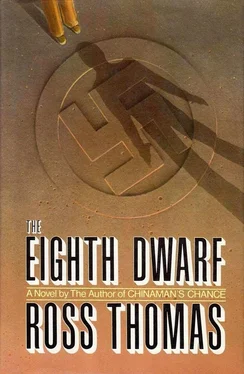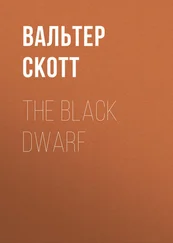“Well, little man,” Bodden said to Ploscaru. “Do you want to lose your wallet?”
“Not particularly.”
Bodden knelt quickly by the footlocker and opened its lid. He took out one of the .45 automatics, checked to make sure it was loaded, studied the dwarf carefully for a moment, and then tossed him the pistol. Ploscaru caught it deftly, with a smile.
“And you, my friend,” Bodden said to Jackson. “You have a preference?”
“Anything that’s handy.”
“Here,” he said, lifting out one of the Thompson submachine guns. “The gangster’s weapon.”
He tossed it to Jackson, who caught it easily and checked it over with sure, quick movements. The voices were still jabbering away at each other in Polish, but closer now, and all three men turned toward the stone steps.
There were six of them, all shabbily dressed, except for the very tall one who seemed to be their leader. when he caught sight of the dwarf, he looked as if he were about to smile, but thought better of it — possibly because of the three guns that were aimed in his direction.
“Well,” the tall man said in German, “what have we here?”
“A reception committee,” Bodden said.
“But why so unfriendly?” the tall man said. “Surely we can do business?”
“No, I think not,” Bodden said. “I think it would be far better if you and your friends were to leave.” He waved the carbine a little as though to emphasize his point.
The tall man’s eyes roved over the cases of cigarettes and candy. “We are prepared to pay a fair price. No one in Frankfurt pays a...”
The tall man never finished his commercial, if that was what it was, because the dwarf took two quick steps backward and jammed the muzzle of his automatic into the small of Bodden’s back. Ploscaru held the automatic there with both hands, but had to raise his arms to do it.
“I think, landlord, the wisest thing for you to do would be to put your rifle down on the floor very carefully.”
The surprise came and went quickly from Bodden’s face. He frowned, and then the frown was replaced by a smile — almost a merry one. “No,” he said.
“No?”
Bodden nodded, still smiling. “You see, little man, I made a decision long ago. And the decision I made was simply this: if anyone ever pointed a gun at me again to make me do something I had no wish to do, then the one who pointed the gun would have to use it.”
Ploscaru cocked his head to one side as though studying the philosophical soundness of Bodden’s resolution. “A brave decision,” he said, taking a quick step to one side, “but a foolish one.”
He bought the automatic around with both hands and slammed it into Bodden’s right kneecap. Bodden didn’t scream, although he sucked in what seemed to be an enormous gulp of air. His right leg started to crumple. As he fell, he let go of the carbine. Ploscaru caught it before it hit the ground, put it down carefully, and then nudged it away with his foot. Bodden was now on the stone floor, his lips bitten, clutching his kneecap with both hands.
“For Christ’s sake, Nick,” Jackson said.
“He’ll walk in an hour or two. Over the years, through necessity, I’ve become quite an expert on kneecaps.” Ploscaru turned to the tall man. “Now, Mircea,” he said in Romanian, “you can load your truck.”
Mircea Ulescu, the ex-policeman turned thief, grinned broadly, and his soft gray eyes shone. “Ah, Nicolae, it is like old times, no?” He turned quickly and snapped orders at the other five men in Polish. They hurried over to the cases of cigarettes and started carrying them up the cellar steps.
“So, Mircea, you are speaking Polish now,” Ploscaru said.
The big man shrugged. “What could I do, Nicolae? They would not learn German. They are such a stubborn race, the Poles.”
Jackson looked at the submachine gun that he was still holding in his hands, frowned at it with something like mild distaste, put it down on the stone floor, and moved over to Bodden. Jackson stared down for a moment at the man, whose lips were still stretched back in a grimace of pain. Then he knelt down beside him and brought out a package of cigarettes and some matches.
“Do you smoke?” he asked.
“I... also... drink,” Bodden said with an effort. He managed to accept a cigarette and a light.
“Let’s see if the tenant left anything behind,” Jackson rose, opened the footlocker in which Oppenheimer had kept his tea things, found a bottle of bourbon and two teacups. He moved back over to Bodden and poured both teacups nearly full.
“Here” he said, “some American painkiller.”
Bodden took a swallow. “An acquired taste, I’d say.”
“Quickly acquired,” Jackson said, raising his own cup. “Who are you, friend?”
Bodden turned his grimace into a smile of sorts. “Nobody.”
Jackson nodded, almost sympathetically. “But not the landlord.”
“No. Not the landlord.”
“A friend of the tenant’s — or rather, the former tenant?”
“Maybe.”
“And maybe not.”
“And maybe not,” Bodden agreed. He took another swallow of the bourbon, sighed, and said, “Your little friend — he’s a bit treacherous, isn’t he?”
“A bit.”
“The next time — well, the next time I’ll not be quite so trusting.”
“When’s this next time going to happen?”
Bodden studied Jackson for a moment. “Soon. I’d say quite soon, wouldn’t you, Mr. Jackson?”
Jackson didn’t bother to try to hide his surprise at the mention of his name. “You’ve got me at a disadvantage there, friend.”
“A small one, but still the only one I seem to have. However, if you need a name to go with my face, I’ll be happy to oblige.”
“Don’t bother.”
“Good. I won’t.”
“Let me guess something,” Jackson said.
“Of course — but first, perhaps, another drop of your American Schnapps. As you say, it’s a taste quickly acquired.”
Jackson filled Bodden’s teacup again. “If you happen to find the former tenant, where will you encourage him to go — East?”
“Why East?”
“As I said, it’s only a guess.”
“We’ll let it remain that. But I’ll give you some advice, Mr. Jackson. Not free advice, which is usually worthless, but advice in exchange for the painkiller, which is already beginning to work a little. My advice is this: when you begin to believe that you can trust your little colleague over there — don’t.”
Jackson grinned. “You hand out good advice, friend.”
“I try, Mr. Jackson, I try.”
They both looked over at Ploscaru, into whose outstretched palm the big Romanian was counting some bills. There were a lot of them, German marks, and every once in a while the big Romanian would wet his finger to aid the accuracy of his count.
The huge cellar was stripped by now. Nothing remained except for the footlocker of weapons. Even the neatly made cot had been removed by the five Poles. Two of them now came back down into the cellar to make the final check. They seemed to be arguing with each other about something. One of them addressed a question in Polish to the big Romanian.
Ulescu silenced them with a quick frown and went on with his counting. When he was through, he smiled and said, “Well, Nicolae, a profitable morning for us both.” Ploscaru nodded and tucked the bills away into a coat pocket. Ulescu turned toward the two Poles and said something to them in their own language. He listened to their reply and then turned back to the dwarf.
“There is a bicycle outside,” he said. “Is it yours?”
“No.”
“They wish to take it.”
Ploscaru shrugged. “Let them.”
Jackson rose. “The bicycle stays,” he said.
Читать дальше












